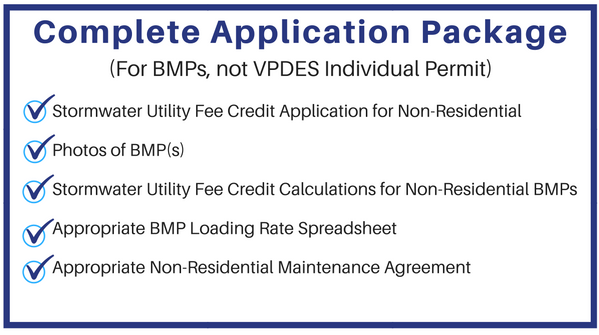Non-Residential properties are those properties that are not defined as residential. Residential properties are defined as any property on which a single-family, duplex, or townhome dwelling exists and is used for noncommercial purposes. Below are the Stormwater Utility Fee Credit Manual, credit application forms and appendix documents you will need to complete a Non-Residential Credit Application.
NOTE: It is recommended that a professional engineer assist in compiling the Non-Residential Credit Application.
- Step 1
Review the SW Utility Fee Credit Manual for Non-Residential [1MB] to determine which Best Management Practices (BMPs) you may already have in place that will qualify for a credit and/or how to assess available crediting options for newly developed BMPs or voluntarily constructed BMPs.
Step 1 (a): Ensure that the impervious area assessment is accurate for your property. Use the Stormwater Utility Mapping Tool to view the impervious area assessment for your property. If you have an issue with the assessment, fill out the Stormwater Utility Fee Petition for Adjustment Form (Appendix F) [521KB].
- Step 2
Complete the Credit Calculation Worksheet [111KB] for each BMP to determine the credit reduction that would result after an application is approved. Ensure applying for a credit is cost-effective for your property. Submit these forms with the complete application package.
- Step 3
Complete SW Utility Credit Application for Non-Residential (Appendix A) [185KB]. Follow the application checklists throughout to determine what documentation is needed to complete the application package.
- Step 4
Complete the appropriate maintenance agreement as outlined in the credit application. Note that Category D does not require a maintenance agreement, and, in some cases, the BMP maintenance agreement may already be on file at the County Clerk of Court's office.
- Stormwater Utility Fee Non-Residential Maintenance Agreement For Pre-Existing Stormwater Management/BMP Facilities (Appendix B) [82KB]
- Stormwater Utility Fee Maintenance Agreement for use with Voluntarily Installed Non-Residential BMPs (Appendix C) [203KB]
- New Development BMP Maintenance Agreement (Appendix D) [82KB]
- Step 5
Complete the appropriate worksheets for determining BMP loading rates and removal rates for nitrogen, phosphorus, and sediment. The Stormwater Utility Fee Program was developed to address the City's required pollutant removals for nitrogen, phosphorus, and sediment. If a BMP has water quality pollutant removal rates that are not already claimed, the City of Harrisonburg is interested in acquiring that overage for our City credits which are submitted annually in the City of Harrisonburg Chesapeake Bay TMDL Action Plan.
- On-Site Required BMP Spreadsheet for determining loading rates and removal rates for Pollutant of Concern (Appendix K) [13KB]
- Retrofitted BMP Spreadsheet for determining loading rates and removal rates for Pollutants of Concern (Appendix L) [14KB]
- Voluntarily Installed BMP Spreadsheet for determining loading rates and removal rates for Pollutants of Concern (Appendix M) [13KB]
- Regional Stormwater BMP Agreement Form (Appendix H) [147KB]
- Step 6
Submit a complete application package to Public Works by July 1. Note that applications submitted after July 1 will be entered for the next billing year and cannot be implemented for the current billing year. Credits are valid for five years if all BMPs are properly maintained.

- Step 7
Re-apply for credit after 5 years of receiving your approval letter with the Stormwater Utility Fee Credit Re-Application (Appendix E) [153KB].
Reference Documents: Still confused? See if the following documents can help guide you through the process. If not, call Public Works at 540-434-5928 or email stormwater@harrisonburgva.gov
- Credit Application Guide for Existing Non-Residential BMPs (Appendix I) [425KB]
- Procedures for completing the Pre-Existing Stormwater Management/BMP Facilities Maintenance Agreement and Applying for a Stormwater Utility Fee Credit (Appendix J) [400KB]
- Guide for Developments, Condominiums, and Neighborhoods with Home Owners Associations of Property Owners [285KB]

